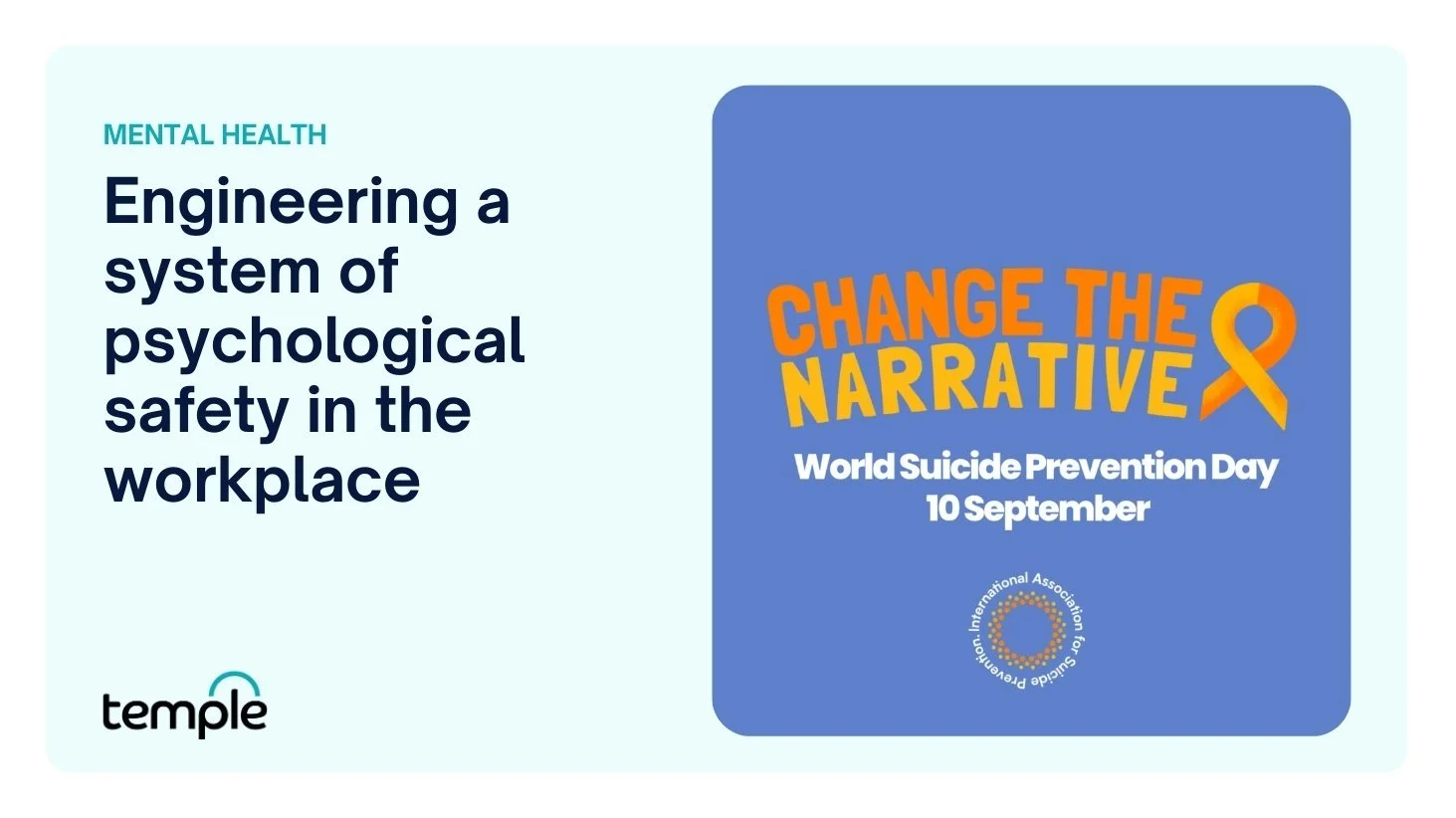Engineering a system of psychological safety in the workplace
Today, on World Suicide Prevention Day, organisations across the globe will share messages of awareness and support.
While awareness is a vital first step, at Temple QMS, we believe in building robust systems that drive meaningful change. We created a podcast on the subject of Mental Health in the work place with Stellar Mind.
Just as we engineer processes to ensure quality and physical safety, we must also engineer a framework for psychological safety. Mental health support shouldn't be a reactive afterthought; it should be a core, integrated component of a high-quality management system.
This isn't just about corporate responsibility; it's about organisational health. A workplace where team members feel psychologically unsafe is a system with a critical flaw. It leads to disengagement, reduced innovation, and higher turnover. On the other hand, a workplace that systematically champions mental well-being is resilient, productive, and fundamentally stronger.
On this important day, let’s move beyond passive awareness and discuss the actionable components of building a genuine system of support. Here’s how you can be an effective ally by helping to engineer psychological safety in your workplace.
1. The Foundational Layer: Proactive Education, Not Just Resources
A list of helpline numbers in a forgotten corner of the intranet is not a system. The foundation of a supportive workplace is proactive education.
Action: Champion training initiatives like Mental Health First Aid (MHFA). This equips team members with the skills to recognise signs of distress, listen non-judgementally, and guide colleagues toward appropriate professional support. Think of it as the psychological equivalent of fire warden training—an essential part of your workplace safety protocol.
2. The Cultural Framework: Normalise the Dialogue
Systems thrive in the right environment. Your workplace culture is the environment in which your support system will either succeed or fail. Secrecy and stigma are the enemies of a supportive culture.
Action: Leaders should lead by example. When senior staff openly and appropriately discuss the importance of mental health, it signals that these conversations are safe and welcome. Integrate well-being check-ins into regular team meetings. Asking "How is everyone's capacity this week?" can be as important as asking "What's the status of the project?"
3. The Human Interface: Practice Active, Compassionate Listening
Every system has a user interface. In a support system, the interface is human-to-human interaction. Being an ally means honing your listening skills.
Action: If a colleague seems to be struggling, find a private moment to check in. Use open-ended questions like, "You seem to have a lot on your plate lately, how are you doing with it all?" The goal is not to solve their problems but to provide a safe space for them to be heard without judgment. Validate their feelings with phrases like, "That sounds incredibly difficult."
4. The Emergency Protocol: Know and Communicate the Crisis Plan
Every safety system needs a clear, well-understood emergency plan. Hoping you'll "know what to do" in a crisis is not a strategy.
Action: Familiarise yourself with your company’s specific protocol for a mental health crisis. Who is the designated point of contact? What external resources (like an Employee Assistance Programme or local crisis teams) can be activated immediately? This information should be clear, accessible, and regularly communicated so that people can act decisively and safely when it matters most.
5. The Sustainability Loop: Champion Self-Care and Boundaries
A system that depletes its own components is unsustainable. An "always-on" culture that celebrates burnout is actively harming the mental health of its people. To be an ally to others, you must first protect your own well-being.
Action: Model healthy behaviours. Take your full lunch break. Avoid sending emails outside of working hours. Use your annual leave. Encourage your teammates to do the same. A culture that respects boundaries is a culture that protects mental health. By prioritising your own well-being, you demonstrate that it is a valid and necessary practice for everyone.
Conclusion: Quality is Holistic
On World Suicide Prevention Day, our message is simple: A commitment to quality is a commitment to the well-being of people. Psychological safety is not an abstract concept; it is the outcome of a well-designed, intentionally implemented system.
Let's work together to build workplaces where asking for help is a sign of strength, and support is a built-in feature, not an optional extra. Let's engineer a better, safer, and more compassionate working world for everyone.

